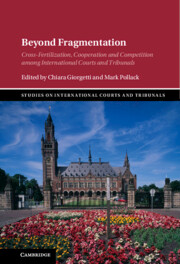 Beyond Fragmentation
Beyond Fragmentation Book contents
- Beyond Fragmentation
- Studies on International Courts and Tribunals
- Beyond Fragmentation
- Copyright page
- Dedication
- Contents
- Contributors
- Foreword
- Preface
- 1 Beyond Fragmentation
- 2 The Procedural Cross-Fertilization Pull
- 3 Procedural Convergence in International Courts and Tribunals
- 4 New Media Evidence across International Courts and Tribunals
- 5 The Acquis Judiciaire, a Tool for Harmonization in a Decentralized System of Litigation?
- 6 Why Cite External Legal Sources?
- 7 Of Gardeners and Bees
- 8 A View from the Coal Face
- 9 Agents of Cross-Fertilization
- Index
2 - The Procedural Cross-Fertilization Pull
Published online by Cambridge University Press: 28 April 2022
- Beyond Fragmentation
- Studies on International Courts and Tribunals
- Beyond Fragmentation
- Copyright page
- Dedication
- Contents
- Contributors
- Foreword
- Preface
- 1 Beyond Fragmentation
- 2 The Procedural Cross-Fertilization Pull
- 3 Procedural Convergence in International Courts and Tribunals
- 4 New Media Evidence across International Courts and Tribunals
- 5 The Acquis Judiciaire, a Tool for Harmonization in a Decentralized System of Litigation?
- 6 Why Cite External Legal Sources?
- 7 Of Gardeners and Bees
- 8 A View from the Coal Face
- 9 Agents of Cross-Fertilization
- Index
Summary
This chapter argues there is a “pull” toward cross-fertilization on procedural questions, meaning cross-fertilization between international courts and tribunals may be more likely for procedural issues than in substantive law. It describes cross-fertilization in relation to procedural issues. Procedural cross-fertilization is a process and is not just about borrowing by adjudicators, but involves contributions by a range of actors. Three considerations facilitate procedural cross-fertilization and even make it somewhat likely: the discretion of adjudicators on procedural issues, adjudicators’ duty to decide numerous procedural issues, and sociological considerations concerning the circulation of a small number of personnel across multiple fora. However, two considerations counterbalance adjudicators’ broad discretion. On one hand, control mechanisms operated by states push adjudicators to remain faithful to their mandates, limiting the space for procedural cross-fertilization. On the other hand, procedural cross-fertilization feeds and is fed by an emerging model of international due process that is affecting all areas of international adjudication.
Keywords
Information
- Type
- Chapter
- Information
- Beyond FragmentationCross-Fertilization, Cooperation and Competition among International Courts and Tribunals, pp. 39 - 86Publisher: Cambridge University PressPrint publication year: 2022
Accessibility standard: Unknown
Why this information is here
This section outlines the accessibility features of this content - including support for screen readers, full keyboard navigation and high-contrast display options. This may not be relevant for you.Accessibility Information
- 2
- Cited by